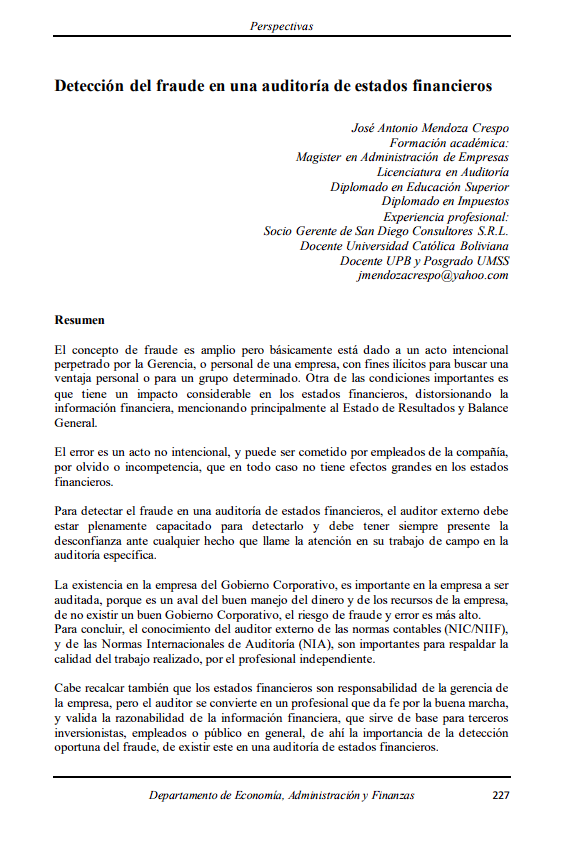Fraud detection in a financial statement audit
DOI:
https://doi.org/10.35319/2s6b0918Keywords:
Fraud, Accounting error, External audit, Financial statements, Corporate governanceAbstract
The concept of fraud is broad but basically refers to an intentional act perpetrated by management or company personnel for illicit purposes to seek a personal advantage or benefit for a particular group. Another important condition is that it has a considerable impact on the financial statements, distorting the financial information, primarily referring to the Income Statement and the Balance Sheet.
An error is an unintentional act, and it can be committed by company employees due to forgetfulness or incompetence, which in any case does not have a major effect on the financial statements.
To detect fraud in a financial statement audit, the external auditor must be fully trained to identify it and must always maintain professional skepticism when encountering any suspicious matter during fieldwork in a specific audit.
The existence of Corporate Governance in the audited company is important because it guarantees the proper management of the company's money and resources. If good Corporate Governance does not exist, the risk of fraud and error is higher.
To conclude, the external auditor’s knowledge of accounting standards (IAS/IFRS) and International Standards on Auditing (ISA) is important to support the quality of the work performed by the independent professional.
It is also worth emphasizing that the financial statements are the responsibility of the company’s management, but the auditor becomes a professional who attests to the proper operation and validates the reasonableness of the financial information, which serves as a basis for third-party investors, employees, or the general public—hence the importance of timely fraud detection, if present, in a financial statement audit.
Downloads
References
IASB (2004): Normas Internacionales de Información Financiera (NIIF), 1ª edición, México, Instituto Mexicano de Contadores Públicos.
WILLIAMS, Jan R.: Guía Miller de PCGA.
Consejo Técnico de Auditoría y Contabilidad – Bolivia (2008): Compendio de Normas de Contabilidad, Bolivia.
Impuestos Nacionales: Ley 843 (texto compilado y actualizado al 31/12/05).
Impuestos Nacionales: Ley 2492 (texto compilado y actualizado al 31/12/05).
AMAT, O.; PERRAMON, J. (2006): Normas Internacionales de Contabilidad NIC/NIIF, 2ª edición, España, Ediciones Gestión 2000.
Instituto Mexicano de Contadores Públicos – IFAC (2007): Normas Internacionales de Auditoría, Lito-Grapo de C.V., Colima 35, México.
Consejo Técnico Nacional de Auditoría y Contabilidad (2008): Compendio de Normas de Auditoría, Bolivia

Downloads
Published
Issue
Section
License
Copyright (c) 2009 Revista Perspectivas

This work is licensed under a Creative Commons Attribution-NonCommercial-ShareAlike 4.0 International License.
La Revista Perspectivas de la Universidad Católica Boliviana, es una revista de acceso abierto, por lo tanto, es de libre acceso en su integridad. Está permitida su lectura, búsqueda, descarga, distribución y reutilización legal en cualquier tipo de soporte únicamente para fines no comerciales, siempre y cuando la obra sea debidamente citada.




